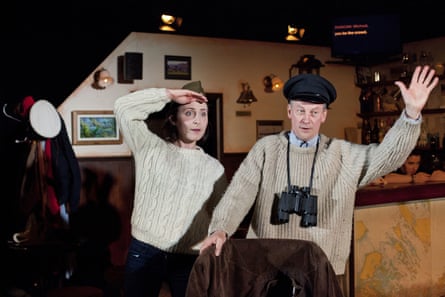It defies all the rules of theatre marketing. Scarcely past midday on a Monday lunchtime, a full 45 minutes before curtain up, the queue for the box office is already snaking on to the road. Inside Òran Mór, a spacious pub-cum-performance venue in Glasgow’s West End, the line of ticket holders is even longer. They are here for A Play, a Pie and a Pint, a lunchtime series launched by David MacLennan in 2004 and not so much a success as a phenomenon.
Nobody could have predicted its popularity back then, but today is typical. They line up like this six days a week for 40 plays a year (plus summer and winter pantomimes), almost all of them new with just a handful of classical adaptations. The tally to date is in excess of 400, making A Play, a Pie and a Pint a bedrock of the Scottish theatre industry. And it is not short on ambition. In its first 13 years, the shoestring organisation has programmed plays by Gregory Burke, Zinnie Harris, David Harrower, David Greig, Liz Lochhead, Bill Paterson and Simon Stephens, not to mention fielding actors from Robbie Coltrane to Mel Giedroyc. In its current month-long collaboration with Edinburgh’s Traverse, it has lined up work by Ian Pattison, creator of Rab C Nesbitt, and Karen Dunbar, star of Phyllida Lloyd’s all-female Shakespeare trilogy at London’s Donmar Warehouse, along with fellow actors-turned-playwrights Julia Taudevin and Anita Vettesse. In past seasons, its influence has stretched to the National Theatre of Scotland, Aberdeen Performing Arts and the Sherman theatre, Cardiff.
It should be said that context is everything. Not every show put on by A Play, a Pie and a Pint is essential viewing. With two weeks’ rehearsal, small casts and limited budget, the shows frequently scrape by on actors’ rough-and-ready energy and the generosity of a willing audience tucking into their pies and pints as the plays proceed. That’s part of the appeal. The atmosphere is goodhearted and convivial; everyone is pleased to give even the shakiest play a fair go. Why not? It’s a better way to spend your lunchtime than most – and it’s a bonus when the play is first-rate.
Kicking off the Traverse series is Pleading by Rob Drummond, whose interactive electoral teaser The Majority was recently at the National Theatre. First heard as a radio play earlier this year, it is typical Play, Pie, Pint fare, in its modest, single-set ambition, bursts of humour and high-stakes tension. It’s a keep-’em-guessing thriller set in a godforsaken cell in some long-haul resting point between Brisbane and London in an Asian state with a zero-tolerance approach to drug trafficking.

Two 18-year-olds, Freya and Michael, have been held there for 22 days after heroin was found in their luggage. “We’re not foreign – we’re British,” they protest indignantly, incapable of assessing the severity of their situation or the limits of their sense of entitlement. Kim Allan and Daniel Cameron play them with a suitably adolescent tetchiness, torn between mutual lust and violence. In David Ian Neville’s production, Nicole Cooper looks on as the local lawyer, scornful of the egocentricity of the two captives even as she attempts to save their lives.
Drummond has pursued two strands in his writing. There are those shows, usually performed by himself, that rest on a clever conceit or theatrical sleight of hand. They would include Mr Write, an improvised children’s play inspired by a volunteer in the audience; Bullet Catch, a recreation of a music-hall magic trick; and last year’s In Fidelity, a live speed-dating show. Perhaps Our Fathers, his forthcoming collaboration with director Nicholas Bone about being atheist sons of religious dads, will be added to the list.
On the other hand are plays he has written along more conventional lines, including Quiz Show, about child abuse in the world of light entertainment, and Grain in the Blood, about a rural family haunted by a dark past. Pleading is in this category, right down to Drummond’s playful love of withheld information. He is forever pushing us in the wrong direction so as to surprise us with what he has hidden in plain sight. He’s a playwright who thinks like a magician. Misdirection is his forte.

From that point of view, Pleading can seem less like a fully fleshed-out play than an exercise in bluff and double bluff, a whodunnit construct with only a limited amount to say about the world at large. Drummond keeps the tension up, though, heightening his warped love story about delusion and obsession with life-and-death stakes, as Freya and Michael come to terms with the likely penalty they face. Keeping us guessing until the end, it certainly provides more twists and turns than your average lunchtime.
A Play, a Pie and a Pint is of far greater significance than a daytime distraction, however. While audiences get the benefit of the shows, the high turnover of work is a boost to the wider theatrical ecology. Many plays have gone on to have an extended life, the format being especially suited to small-scale touring and slots on the Edinburgh fringe. But even without that, the series is a fruitful seedbed for first-time writers, a chance to flex the muscles for established writers, and an extra source of employment for cast and crew. It may fly in the face of marketing logic, but audiences, like artists, know they’re on to a good thing.
- Pleading is at Òran Mór, Glasgow, until 30 September (box office 08444 771 000). Then at Traverse, Edinburgh, 3–7 October. The 24th season of A Play, a Pie and a Pint continues until 25 November.

Comments (…)
Sign in or create your Guardian account to join the discussion